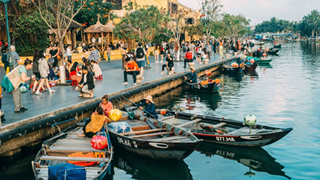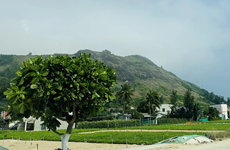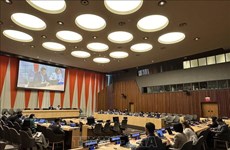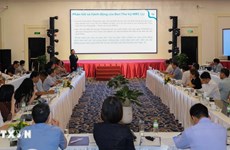Ministry sets forth solutions to environmental protection
It is necessary to promptly devise a national plan on environmental protection to serve as the foundation for appraising and approving investment projects in regions across the country.
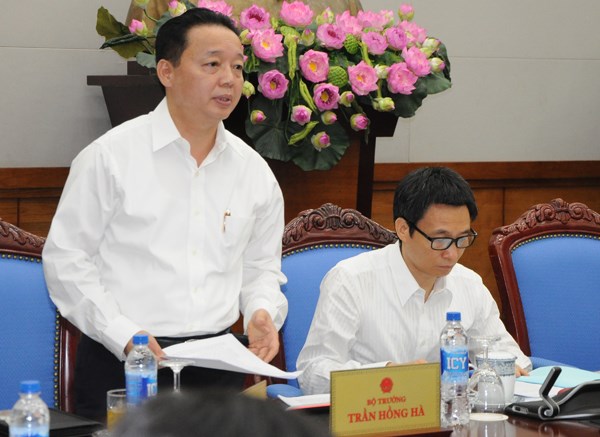 Minister of Natural Resources and Environment Tran Hong Ha speaks at the teleconference (Source: botruong.monre.gov.vn)
Minister of Natural Resources and Environment Tran Hong Ha speaks at the teleconference (Source: botruong.monre.gov.vn)This is among solutions to improve environmental protection put forth by the Ministry of Natural Resources and Environment in a report presented by Minister Tran Hong Ha at a teleconference on the environment held in Hanoi on August 24.
The ministry also proposed issuing regulations on preventing, responding to and handling environmental incidents, which should specify the mechanisms of instruction and coordination among ministries and central agencies and local authorities.
A system of criteria should be promulgated to select high-tech and environmentally-friendly projects for priority in development in line with the policy on green growth and sustainable development.
Environmental statistics should be included in the system of socio-economic statistics, the ministry suggested, adding that regulations on strategic environmental assessment and environmental impact assessment must be revised, as must regulations on the appraisal and approval of environmental impact assessment report.
Other solutions include conducting surveys on sources of waste discharge and pollutants nationwide; building a system of environment database of ministries, sectors, local administrations and enterprises to facilitate management; and establishing a mechanism for information sharing and warning from central to local levels.
The ministry urged adjusting and issuing technical standards on the environment, especially for sectors likely to cause pollution; and reviewing the planning and construction of waste treatment facilities, while promoting the development of the environment industry with incentives for investment in waste treatment and recycling.
The ministry called for stricter inspection and monitoring of the observance of environmental regulations by operational projects, firstly those discharging waste into rivers and seas.
In the long term, it is necessary to refine policies and laws in the field; enhance State management agencies’ capacity for environmental protection; and diversify capital resources for this work.
Besides, the ministry underscored the need to swiftly apply criminal sanctions on environmental violations, complete the plan on removing serious polluters by 2020, enhance international cooperation and develop science –technology in service of environmental protection.
More efforts must be made to raise public awareness of environmental protection and green growth.
To effectively implement such solutions, Minister Ha proposed the Government and Prime Minister assign specific tasks to ministries, sectors and localities, and the National Assembly revise legal regulations on investment, construction and environment with a focus on green growth and sustainable development.
The ministry reported to the conference that every year, there are more than 2,000 investment projects that need to make reports on their impact on the environment.
Therefore, if the assessment of those reports is not done properly and preventive measures are not taken, there will be great risks for the environment.
The country is currently home to 283 industrial zones which discharge over 550,000cu.m of wastewater per day, not to mention 615 industrial clusters along with over 500,000 production facilities.
The country also has more than 13,500 medical facilities which generate over 47 tonnes of harmful wastes and 125,000cu.m of wastewater every day.
Furthermore, 787 urban areas discharge into the environment 3 million cu.m of wastewater per day, but only 40 out of the urban areas have standard waste treatment systems with a total capacity of 800,000cu.m per day.
The ministry also pointed out that the use of nearly 43 million motorbikes and over 2 million cars nationwide generate huge gas emission that is polluting the air environment.
Over 23 million tonnes of domestic waste, 7 million tonnes of industrial waste, and 630,000 tonnes of harmful waste, together with 337 insanitary landfills and over 100 low-capacity incinerators are also the reasons for environmental pollution.
Besides, discarded packaging from around 100,000 tonnes of plant protection chemicals each year is another source of dangerous pollutants.
Notably, the large-scale environmental incident along the central coast in April has caused both short-term and long-term socio-economic and environmental consequences, directly affecting the fisheries and tourism sectors and causing social disorder and public concern.
Drought and desertification are also becoming more serious due to extreme weather and climate change.
Biological diversity is regressing quickly, while such ecosystems as mangrove forests and coral reefs are also facing a risk of degradation.
The ministry noted that environment-related issues related to transnational rivers are becoming more complicated. The construction of hydropower plants on the main stream of the Mekong River of several nations is causing huge consequences on the Mekong Delta region.-VNA
